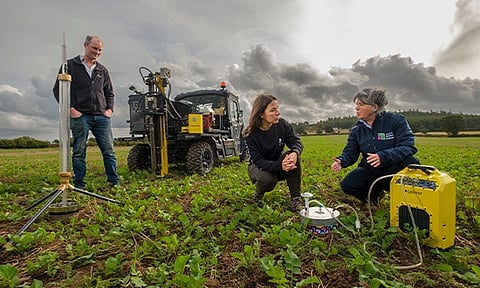
- Home
- EventsEvents
- Product Launches
- CategoriesCategories
- Advertise
- Opinion

Diageo, the maker of Johnnie Walker whisky, Don Julio tequila and Guinness, has announced two regenerative agriculture programmes across its tequila and scotch brands in Mexico and Scotland respectively. The programmes are focused on reducing the carbon emissions of farming barley and wheat for Scotch whisky and agave for tequila, whilst driving additional benefits for the farmers.
Both programmes will hope to drive positive outcomes of enhanced biodiversity, improved water stewardship, carbon reduction and better soil health management. The programmes will look at locally adapted practices such as cover crops, reduced cultivations and crop rotations.
The tequila regenerative agriculture pilot will build the local knowledge pool of agave regenerative practices and investigate how the plant holds carbon over a 6 to 7 -year growth cycle. The programme will span across Diageo managed farms and its network of producers of the agave required for Diageo’s tequila brands, including Don Julio, Casamigos, DeLeon and Astral. The first phase of the scotch programme will focus on approximately 20 farms in three key barley and wheat sourcing regions in Scotland for brands including Johnnie Walker, Talisker and The Singleton.
Whilst the programmes will aim to reduce carbon emissions, they will also aim to build supply resilience, particularly in Jalisco, Mexico, a region that is exposed to climate risks, by building soil health. Both programmes will provide greater resilience and knowledge to the farmers on how to farm and adapt their farming practices in response to climate change.
Ewan Andrew, president of global supply chain & procurement and chief sustainability officer, commented, “As we commit to continued investment in long term business growth, we’re excited to expand our regenerative farming work more formally beyond our current Guinness programme in Ireland. The Scotch Whisky and Tequila brands have such a strong connection to their local communities, and as we build increased resilience and productivity across our end-to-end supply chains, we are building broader partnerships to enhance the impact of regenerative farming practices at scale.”
The scotch and tequila programmes are being delivered in partnership with agriculture and soil carbon experts, including Agricarbon and James Hutton Limited. Agricarbon will help Diageo build the baselines of how much carbon the soil currently holds and track soil carbon changes over time across both geographic contexts, while James Hutton Limited will investigate how regenerative farming practices can improve soil structure, biological activity and water retention rate in the Scotch programme.
Annie Leeson, chief executive officer and co-founder of Agricarbon, commented, “Building our knowledge and understanding of the different raw materials across Diageo’s supply chain is key to reducing emissions and monitoring carbon changes in soils in different farming systems. Working with Diageo, we are pioneering large-scale assessments of soil carbon stocks”
The outcomes of Diageo’s global regenerative agriculture programmes are expected to contribute to a reduction in Diageo’s scope 3 carbon emissions reduction target as outlined in its 10-year ESG action plan, Society 2030: Spirit of Progress. The programmes form part of Diageo’s investment of £1 billion into developing a low-carbon world.
Click HERE to subscribe to our FREE Weekly Newsletter
